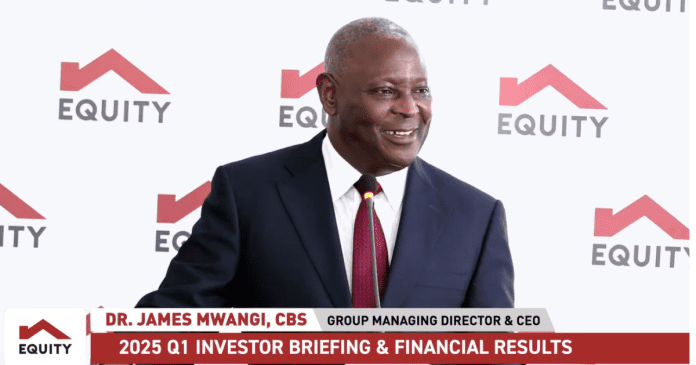Equity Bank CEO James Mwangi has come out strongly to explain why the lender has sacked over 100 employees in recent weeks, in what he describes as a major push to restore trust and uphold a corruption-free environment.
Speaking during the bank’s investor briefing on Thursday, May 29, Mwangi said the action followed an intensive internal investigation launched after Equity lost Sh 1.5 billion in 2024. The theft, allegedly orchestrated by an insider in collaboration with external players, raised serious questions about internal integrity and spurred a wider audit of staff conduct.
Why Judge released lawyer linked to Sh1.5bn Equity Bank heist on bond
According to the CEO, the investigation dug deep into whether staff were compromised in their dealings with customers and service providers. “They did a deep dive on conduct. Do you carry yourself appropriately? Amazingly, they said the easiest one is to see whether people are conflicted with our partners,” he explained.
The bank focused on transactions involving suppliers, procurement, insurance claims, and loan processing.
“We were shocked that we could see money changing hands between… we didn’t know whether it’s appreciation, whether it’s a kickback,” he added. “We said, but you have signed this code of conduct. It says you can’t.”
Mwangi said some employees had been receiving unexplained deposits either in their salary accounts or on their registered M-Pesa numbers from entities linked to the bank, including customers and colleagues. Those who failed to justify the transactions were dismissed and given 14 days to appeal.
Equity Bank lowers interest rates to enhance credit access and economic growth
“It’s a fair process,” he emphasized. “You can’t come here to borrow school fees for your children, and somebody asks you, ‘Why don’t you buy me lunch?’ You didn’t come to buy people lunch — you came to borrow school fees. Micro-enterprises can’t be asked for kickbacks. Not in this bank.”
Mwangi reiterated that Equity was built on trust and values, and that culture must be “lived” — not just printed on office walls.
“Customers must be given services without expectations of rewards and inducements. We have said no, no, no, on behalf of the shareholders. They didn’t set up this company for people to have toll stations,” he declared.
He made it clear that no one was above reproach. “We’ll be very firm. There will be no sacred cow,” he said.
The CEO also noted that the bank wasn’t just auditing skills and capabilities for the future, but also scrutinizing trustworthiness. “Can we trust you? Can you uphold the currency of trust?” he asked.
Mwangi closed his remarks with an optimistic outlook:
“We are very excited about what we have been able to achieve. It looks like the future is very bright for Equity Bank, with everybody being measured whether they live the culture.”









